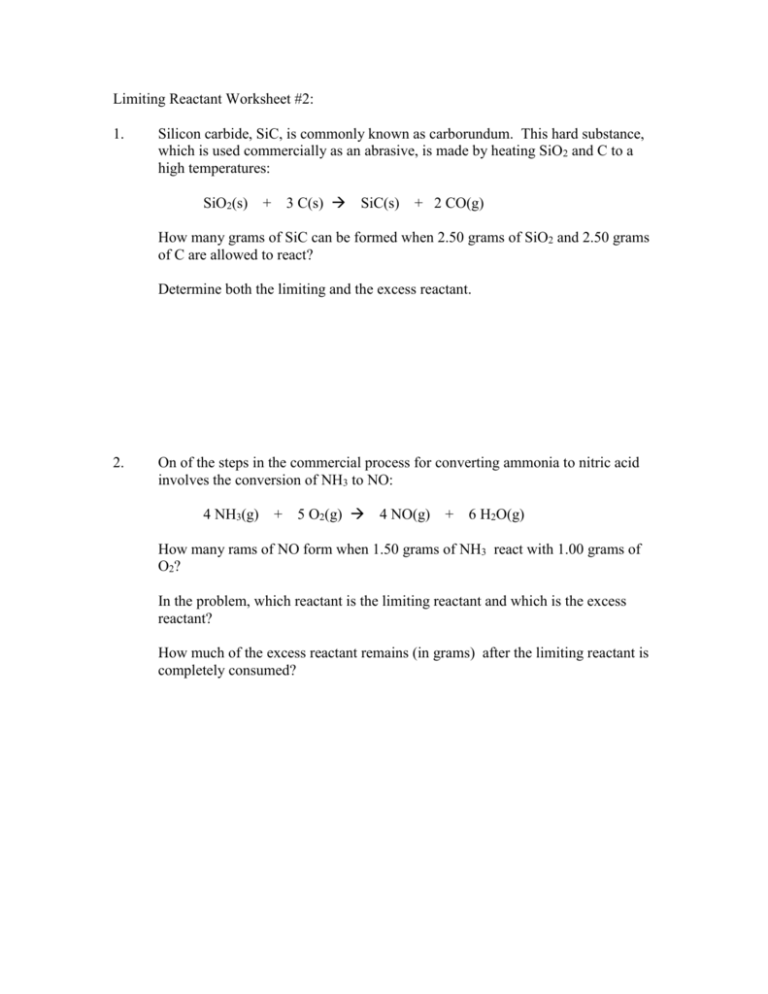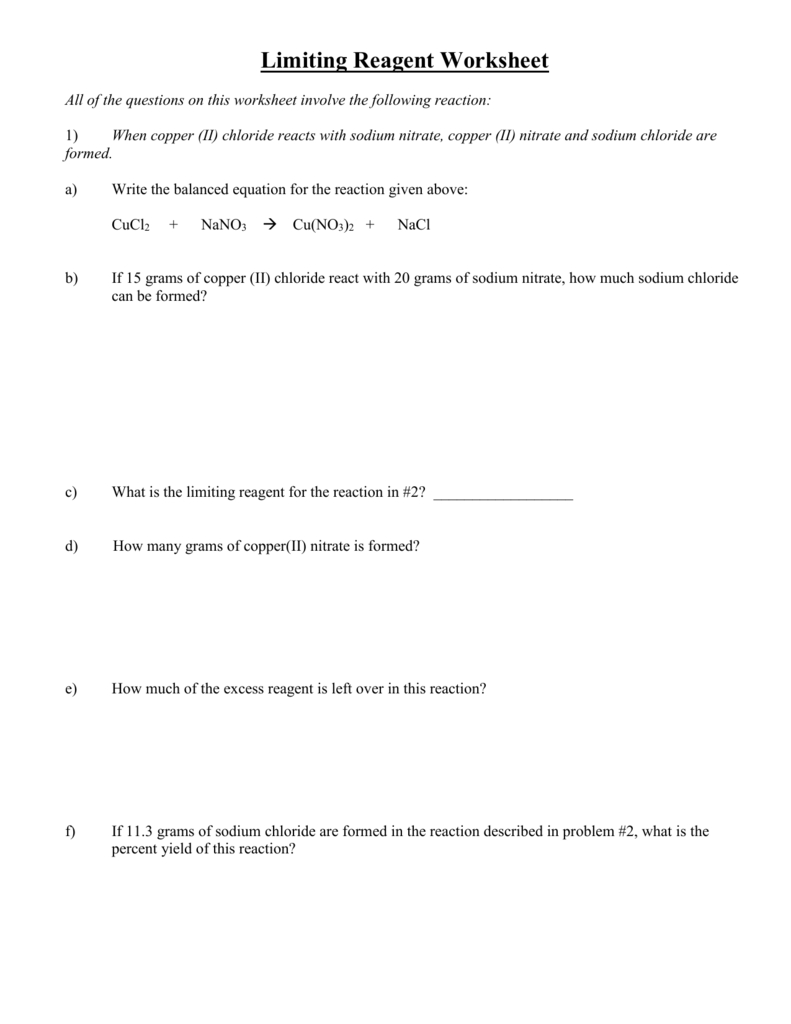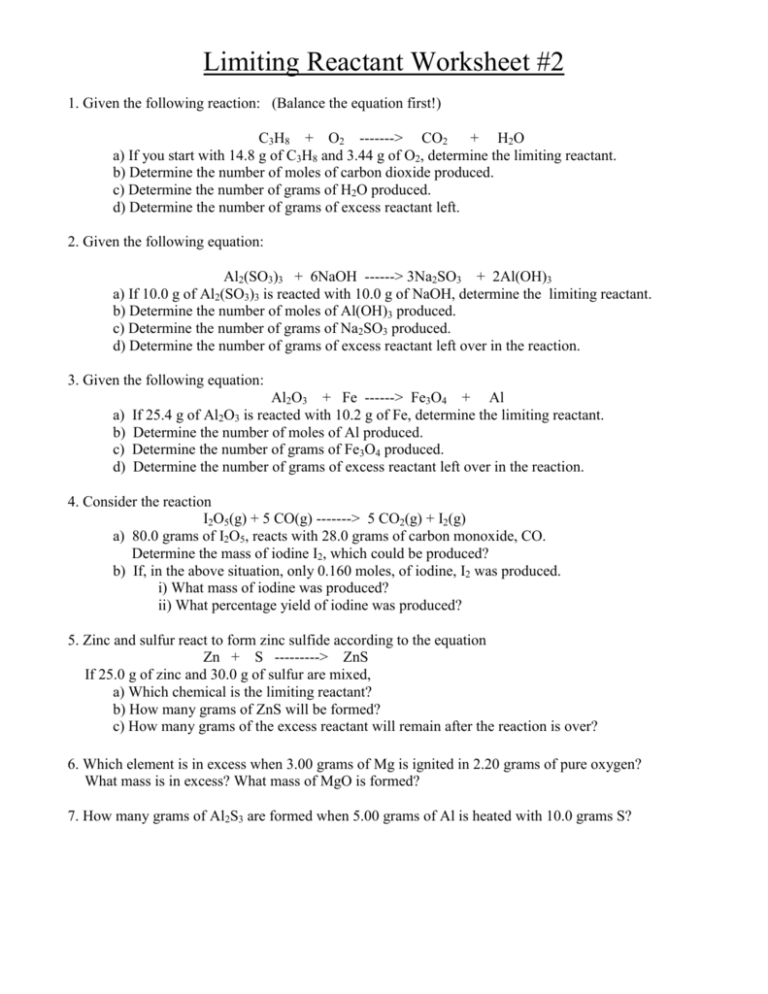Limiting Reagent Worksheet Answers - What is the limiting reagent in the reaction described in problem 2? How many moles of nh3 can be produced from the reaction of 28 g of n2 ? A student places 2.36 moles of acetic acid. What mass of copper is formed when 2.00 g of copper(ii) cuo + h2 → cu + h2o oxide reacts with 1.00 g of hydrogen? (b) how many moles of carbon dioxide gas (co2) will form? (a) identify the limiting reactant. Because sodium iodide is the reagent that causes 8.51 grams of sodium. Using your knowledge of stoichiometry and limiting reagents, answer the following questions: 2 al + 6 hbr → 2 albr 3 + 3 h 2 a. Limiting reactant worksheet #1 1.
(a) identify the limiting reactant. 2 al + 6 hbr → 2 albr 3 + 3 h 2 a. What is the limiting reagent in the reaction described in problem 2? 1) write the balanced equation for the reaction. Because sodium iodide is the reagent that causes 8.51 grams of sodium. Using your knowledge of stoichiometry and limiting reagents, answer the following questions: (b) how many moles of carbon dioxide gas (co2) will form? Limiting reactant worksheet #1 1. How many moles of nh3 can be produced from the reaction of 28 g of n2 ? What mass of copper is formed when 2.00 g of copper(ii) cuo + h2 → cu + h2o oxide reacts with 1.00 g of hydrogen?
2 al + 6 hbr → 2 albr 3 + 3 h 2 a. (b) how many moles of carbon dioxide gas (co2) will form? Using your knowledge of stoichiometry and limiting reagents, answer the following questions: How many moles of nh3 can be produced from the reaction of 28 g of n2 ? Limiting reactant worksheet #1 1. Because sodium iodide is the reagent that causes 8.51 grams of sodium. What mass of copper is formed when 2.00 g of copper(ii) cuo + h2 → cu + h2o oxide reacts with 1.00 g of hydrogen? (a) identify the limiting reactant. What is the limiting reagent in the reaction described in problem 2? 1) write the balanced equation for the reaction.
Limiting Reagent Worksheet With Answers
Because sodium iodide is the reagent that causes 8.51 grams of sodium. What is the limiting reagent in the reaction described in problem 2? A student places 2.36 moles of acetic acid. Using your knowledge of stoichiometry and limiting reagents, answer the following questions: (a) identify the limiting reactant.
A. Chem Worksheets Chapter 10 Limiting Reactants and MIxed Mole
How many moles of nh3 can be produced from the reaction of 28 g of n2 ? (b) how many moles of carbon dioxide gas (co2) will form? What mass of copper is formed when 2.00 g of copper(ii) cuo + h2 → cu + h2o oxide reacts with 1.00 g of hydrogen? (a) identify the limiting reactant. 2 al.
Limiting Reagent Worksheet
What mass of copper is formed when 2.00 g of copper(ii) cuo + h2 → cu + h2o oxide reacts with 1.00 g of hydrogen? What is the limiting reagent in the reaction described in problem 2? 1) write the balanced equation for the reaction. 2 al + 6 hbr → 2 albr 3 + 3 h 2 a. (a).
Limiting Reactant Worksheet 2
2 al + 6 hbr → 2 albr 3 + 3 h 2 a. A student places 2.36 moles of acetic acid. (b) how many moles of carbon dioxide gas (co2) will form? Because sodium iodide is the reagent that causes 8.51 grams of sodium. Using your knowledge of stoichiometry and limiting reagents, answer the following questions:
Limiting Reagent Worksheets
Because sodium iodide is the reagent that causes 8.51 grams of sodium. 2 al + 6 hbr → 2 albr 3 + 3 h 2 a. Limiting reactant worksheet #1 1. Using your knowledge of stoichiometry and limiting reagents, answer the following questions: What is the limiting reagent in the reaction described in problem 2?
Limiting Reagent Worksheet With Answers
1) write the balanced equation for the reaction. 2 al + 6 hbr → 2 albr 3 + 3 h 2 a. Because sodium iodide is the reagent that causes 8.51 grams of sodium. (a) identify the limiting reactant. What is the limiting reagent in the reaction described in problem 2?
SOLUTION Moles limiting reagent and molarity worksheet with answers
Using your knowledge of stoichiometry and limiting reagents, answer the following questions: (a) identify the limiting reactant. A student places 2.36 moles of acetic acid. How many moles of nh3 can be produced from the reaction of 28 g of n2 ? (b) how many moles of carbon dioxide gas (co2) will form?
Limiting Reagents Worksheets
(a) identify the limiting reactant. What is the limiting reagent in the reaction described in problem 2? Limiting reactant worksheet #1 1. A student places 2.36 moles of acetic acid. How many moles of nh3 can be produced from the reaction of 28 g of n2 ?
Limiting Reagent Worksheet 1 Answers Printable Word Searches
1) write the balanced equation for the reaction. 2 al + 6 hbr → 2 albr 3 + 3 h 2 a. (b) how many moles of carbon dioxide gas (co2) will form? How many moles of nh3 can be produced from the reaction of 28 g of n2 ? Using your knowledge of stoichiometry and limiting reagents, answer the.
Limiting Reagent Problems And Answers
Because sodium iodide is the reagent that causes 8.51 grams of sodium. What mass of copper is formed when 2.00 g of copper(ii) cuo + h2 → cu + h2o oxide reacts with 1.00 g of hydrogen? Limiting reactant worksheet #1 1. 2 al + 6 hbr → 2 albr 3 + 3 h 2 a. (b) how many moles.
(A) Identify The Limiting Reactant.
What is the limiting reagent in the reaction described in problem 2? Using your knowledge of stoichiometry and limiting reagents, answer the following questions: What mass of copper is formed when 2.00 g of copper(ii) cuo + h2 → cu + h2o oxide reacts with 1.00 g of hydrogen? 2 al + 6 hbr → 2 albr 3 + 3 h 2 a.
How Many Moles Of Nh3 Can Be Produced From The Reaction Of 28 G Of N2 ?
Because sodium iodide is the reagent that causes 8.51 grams of sodium. 1) write the balanced equation for the reaction. A student places 2.36 moles of acetic acid. Limiting reactant worksheet #1 1.









